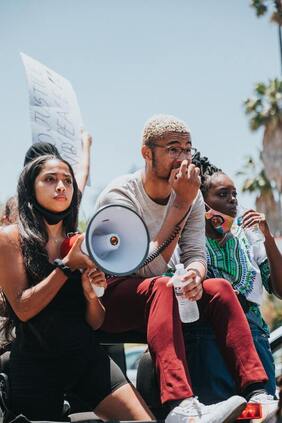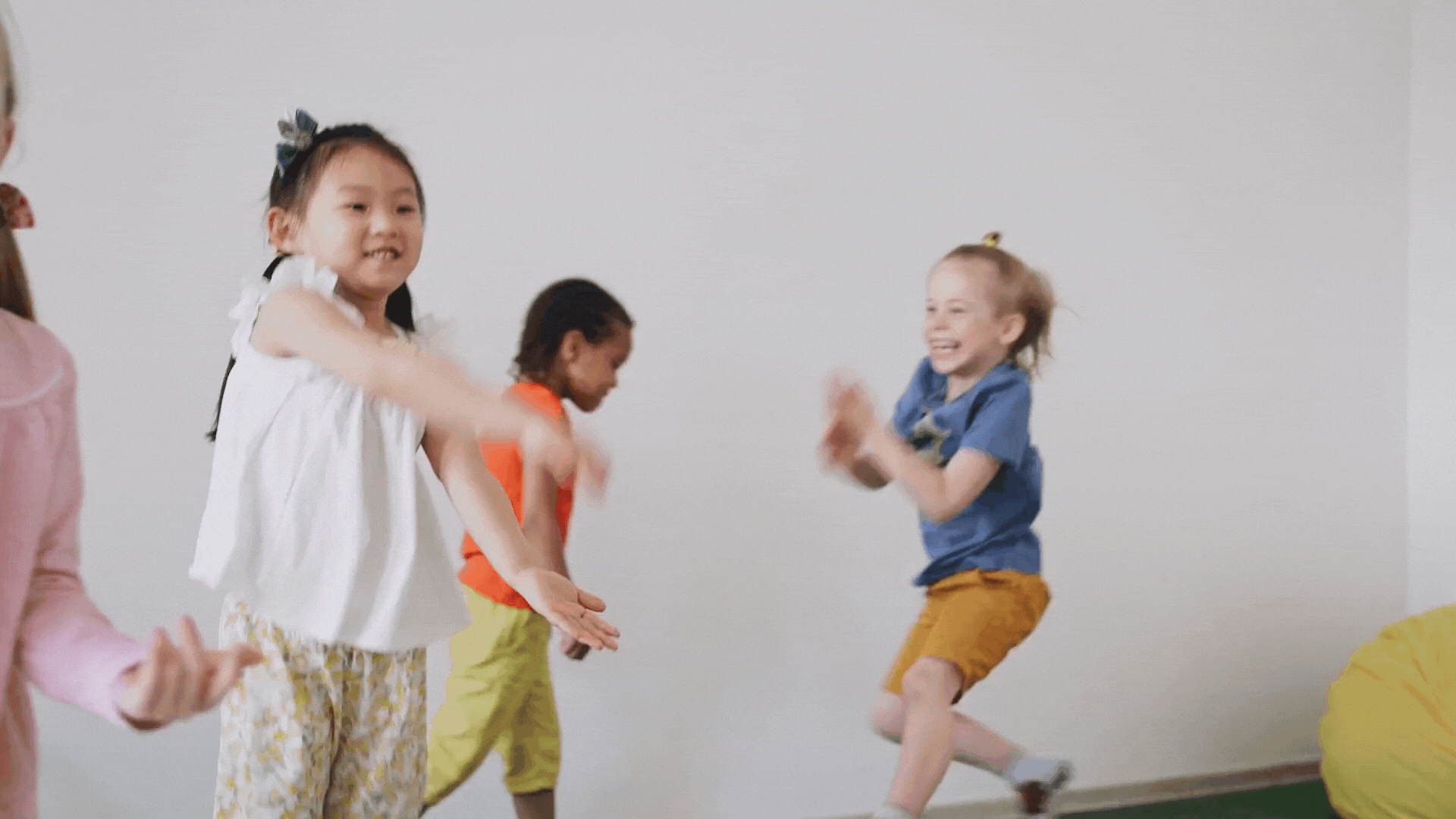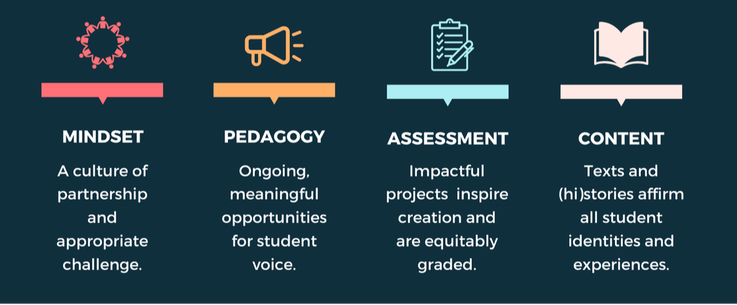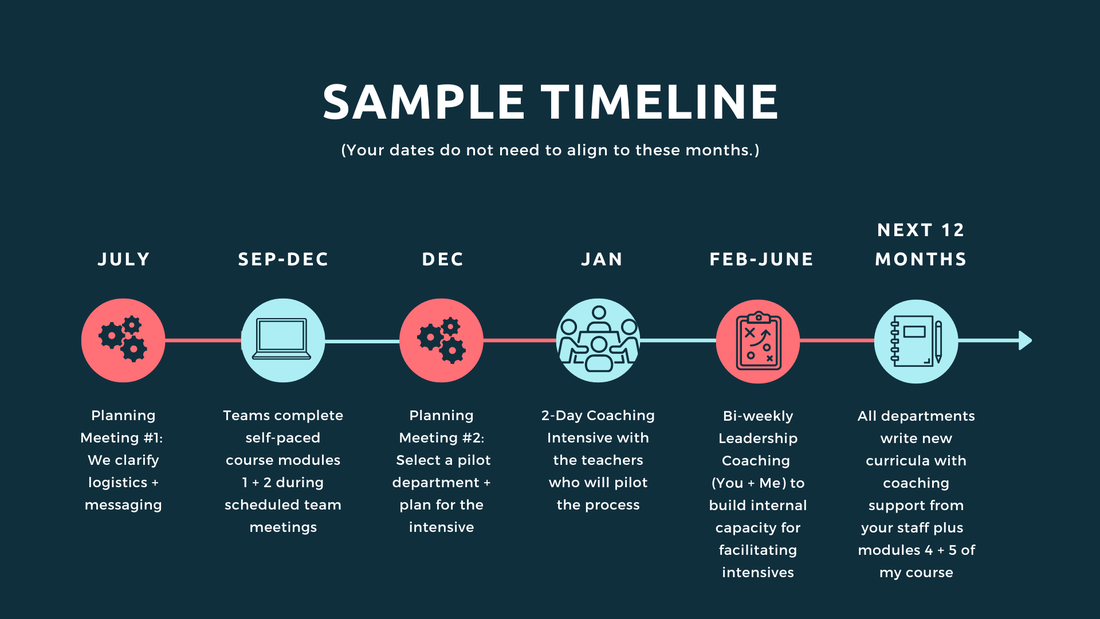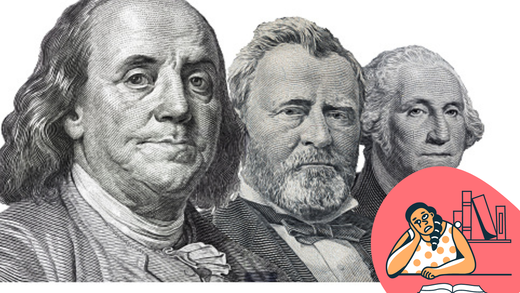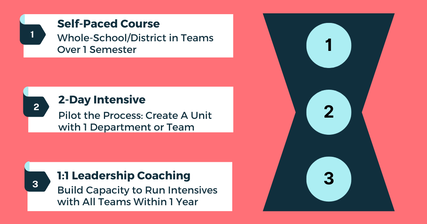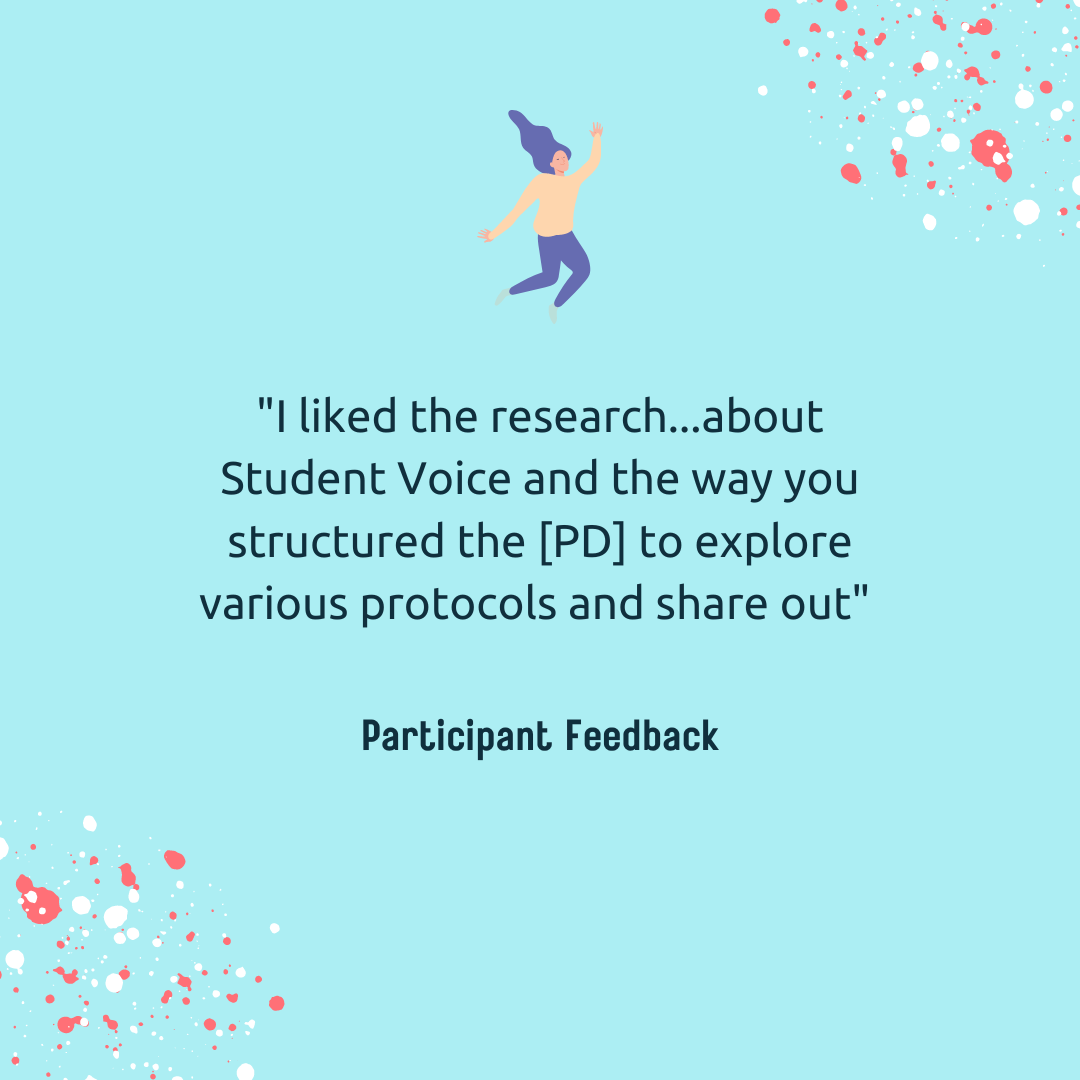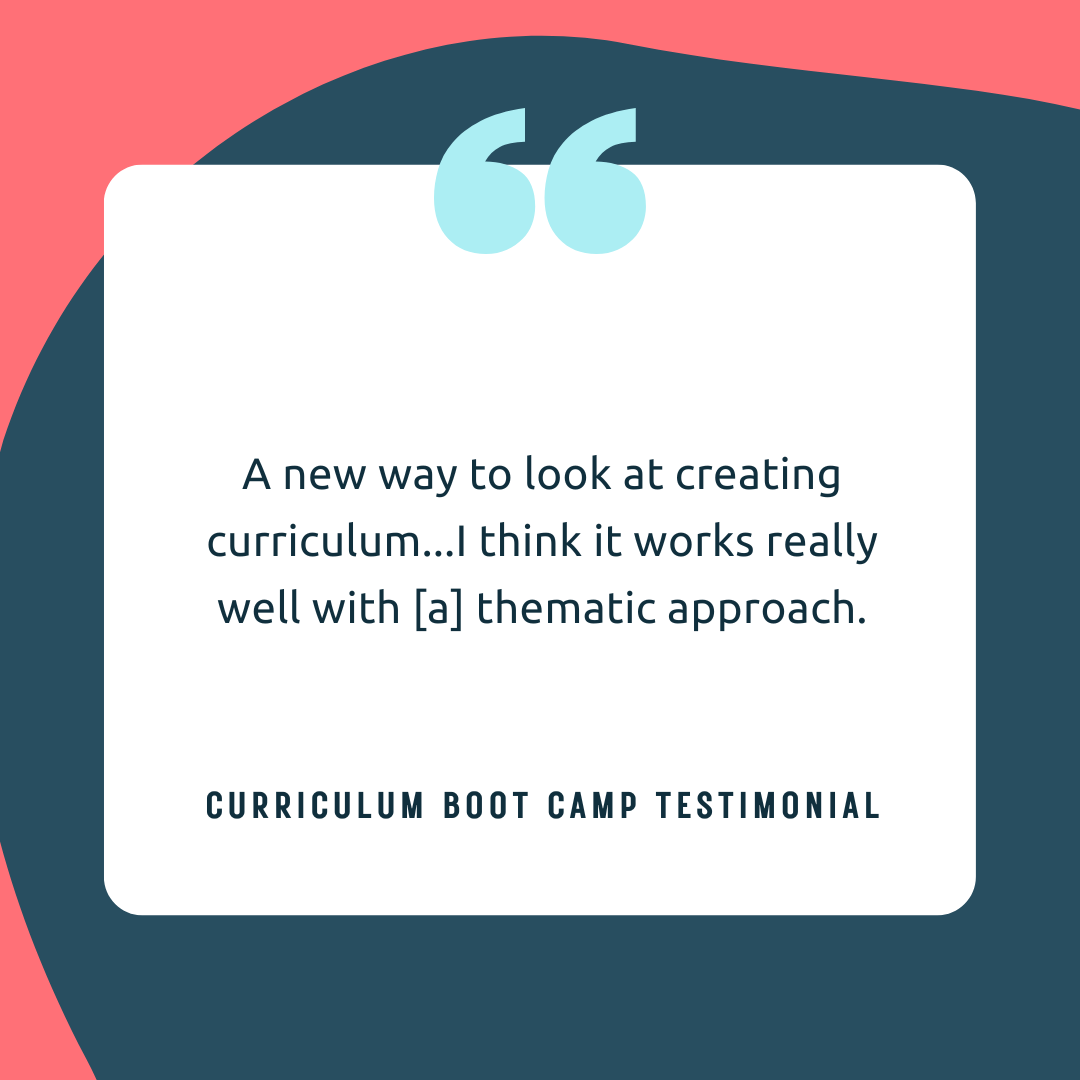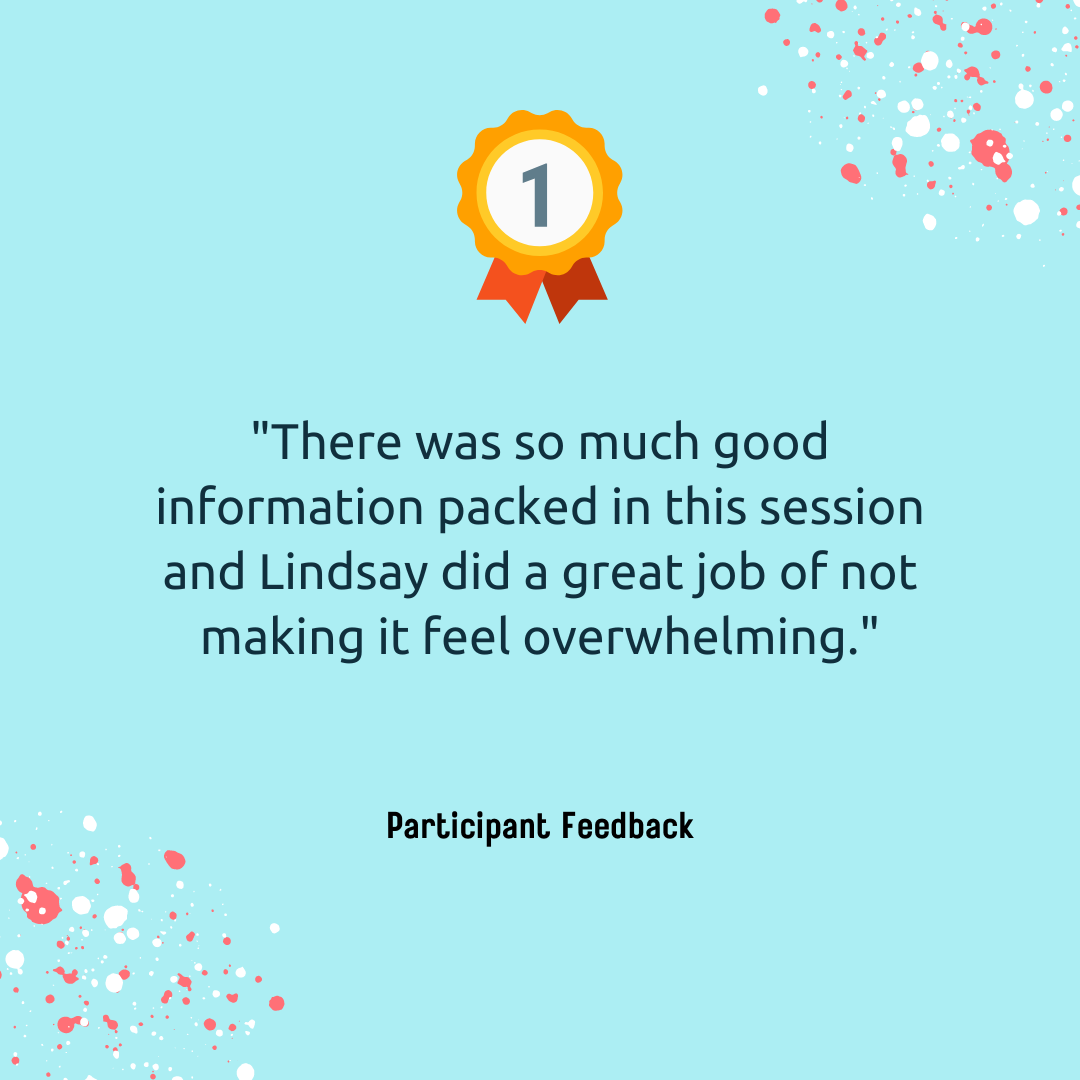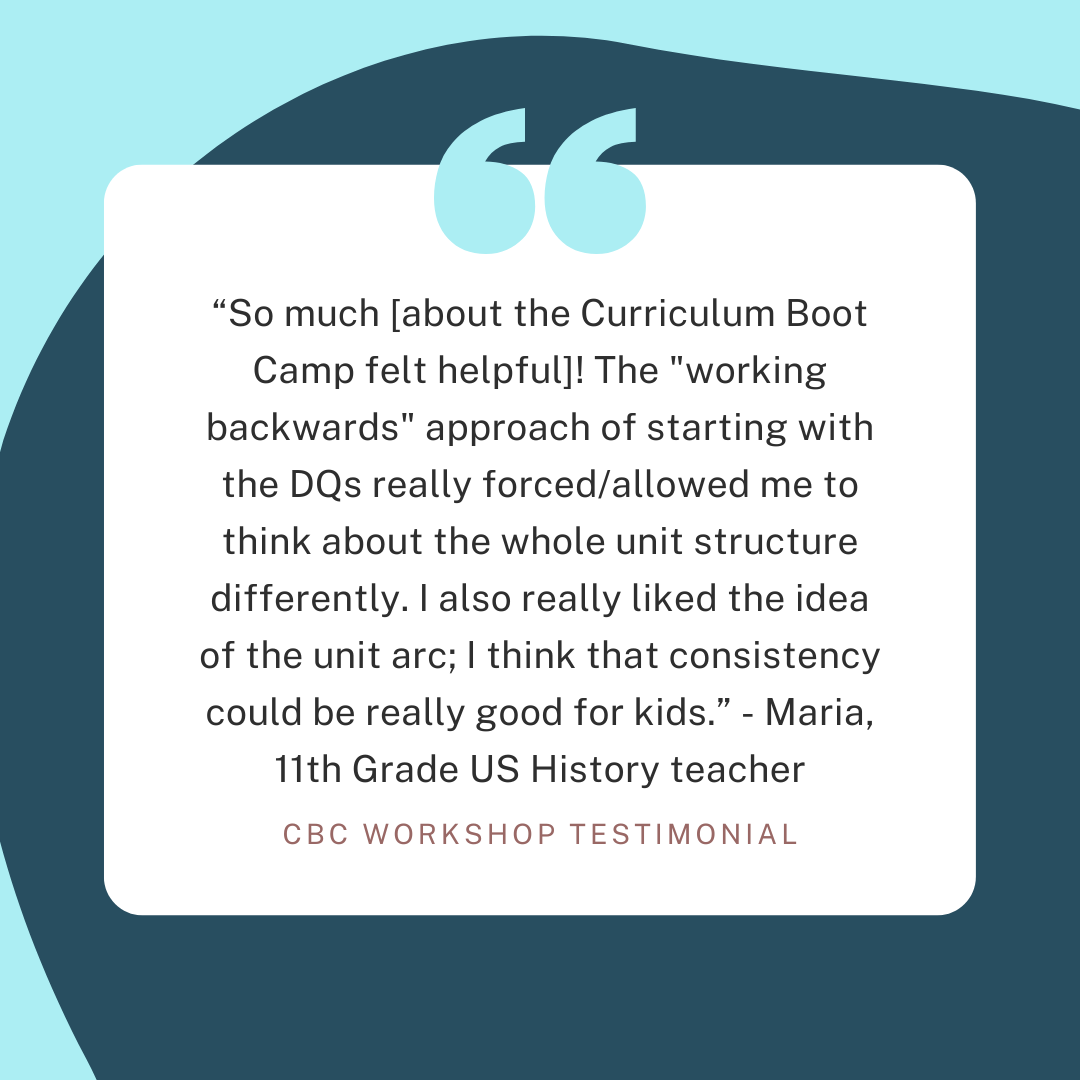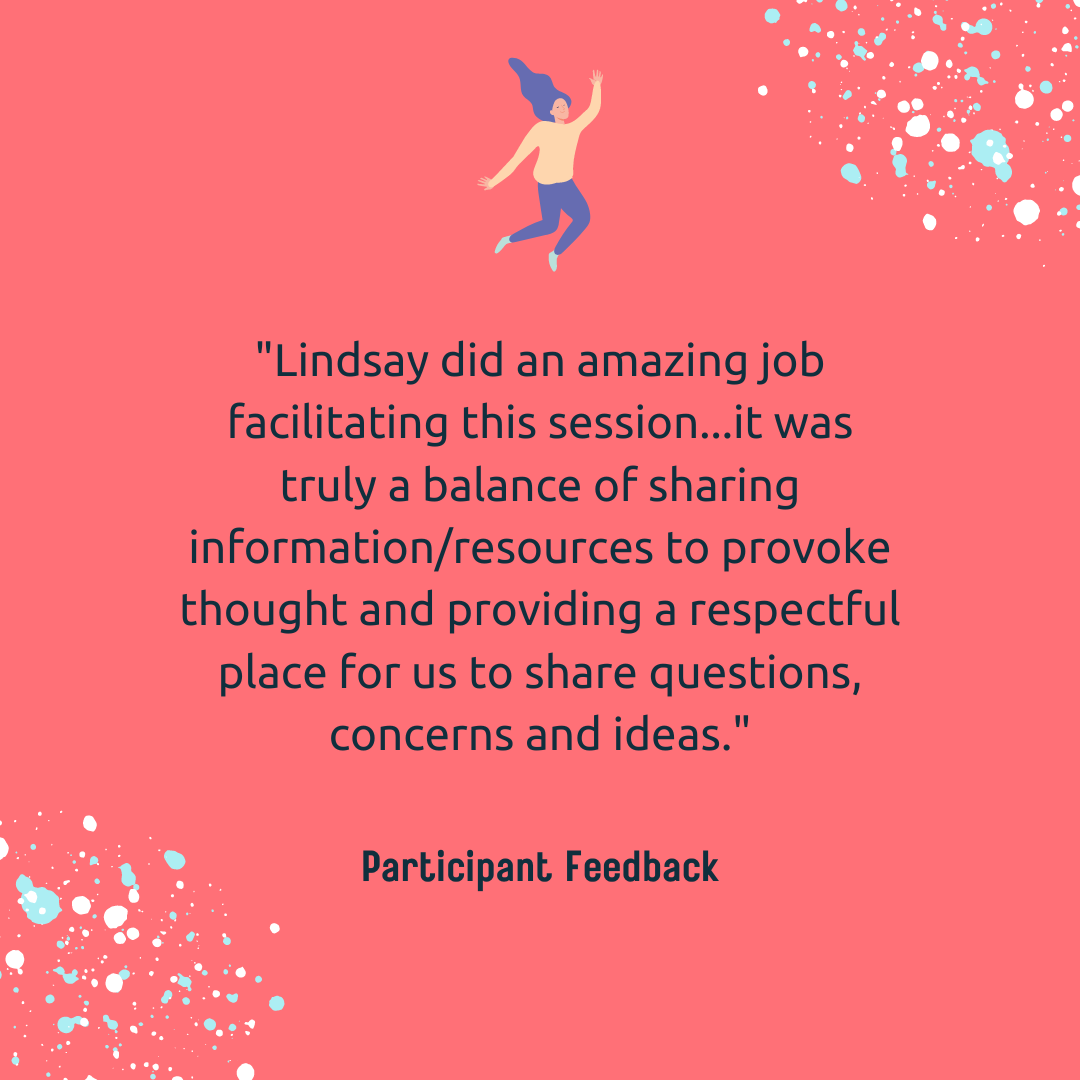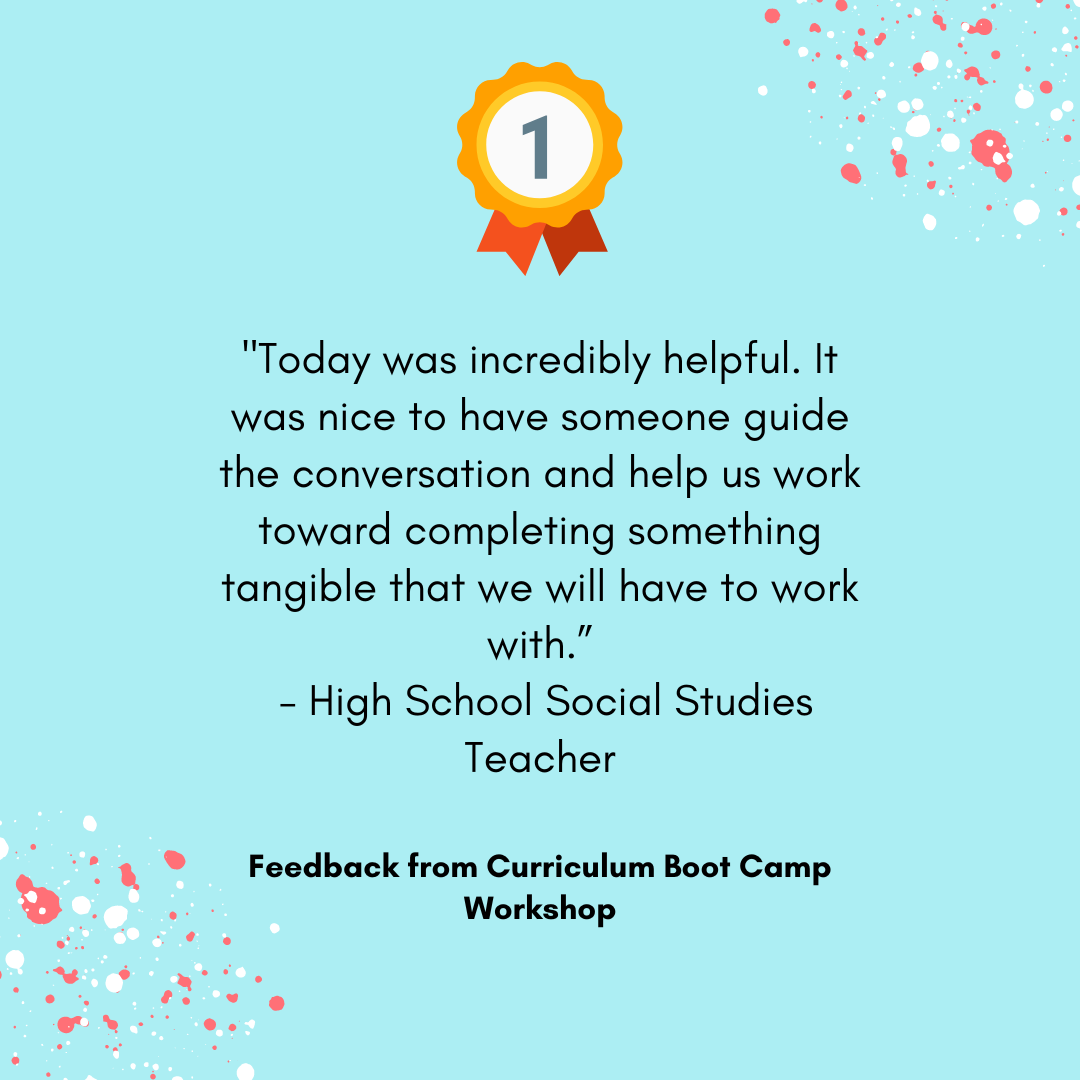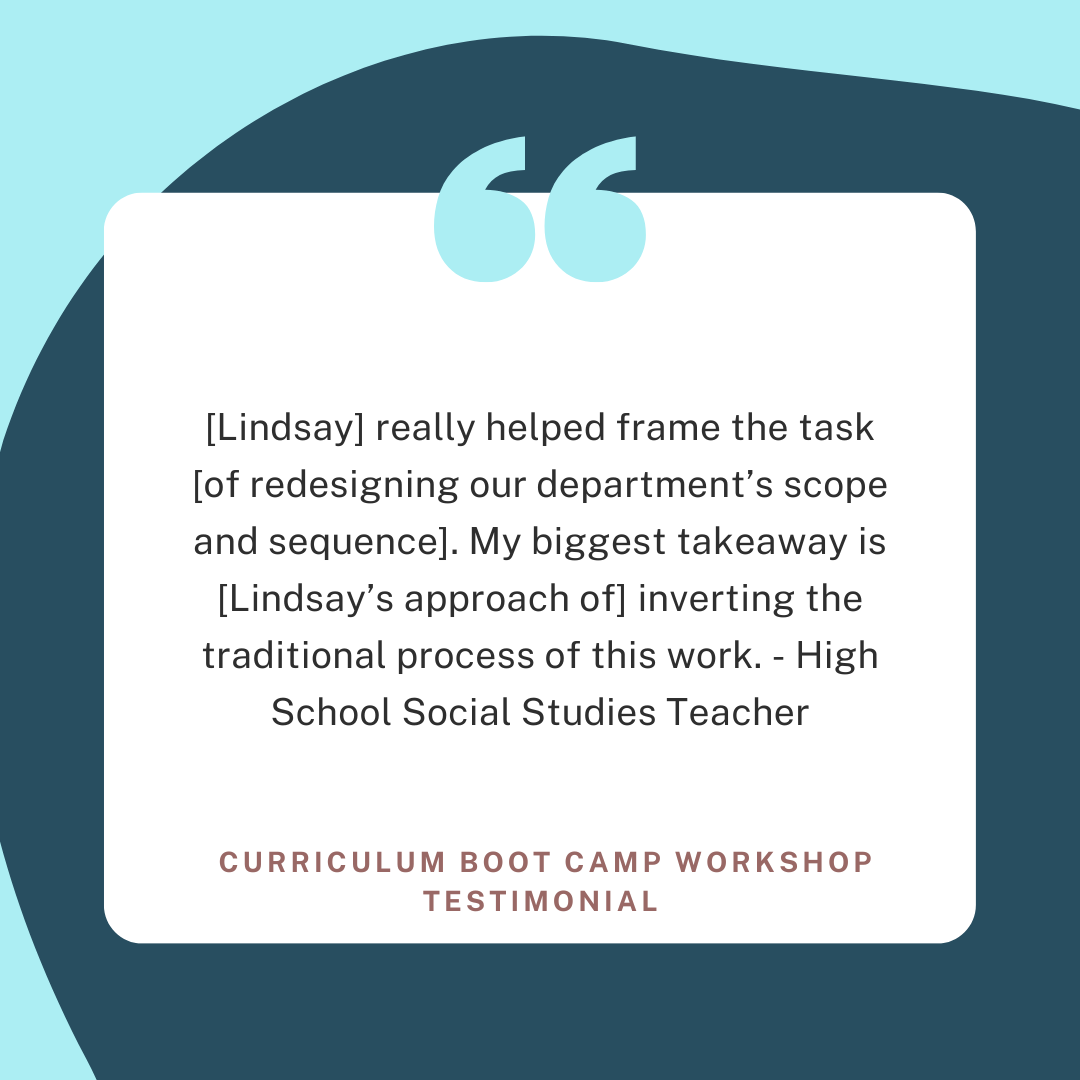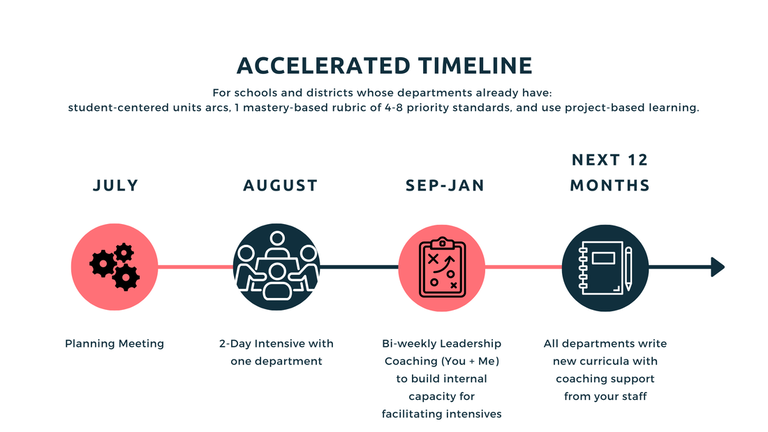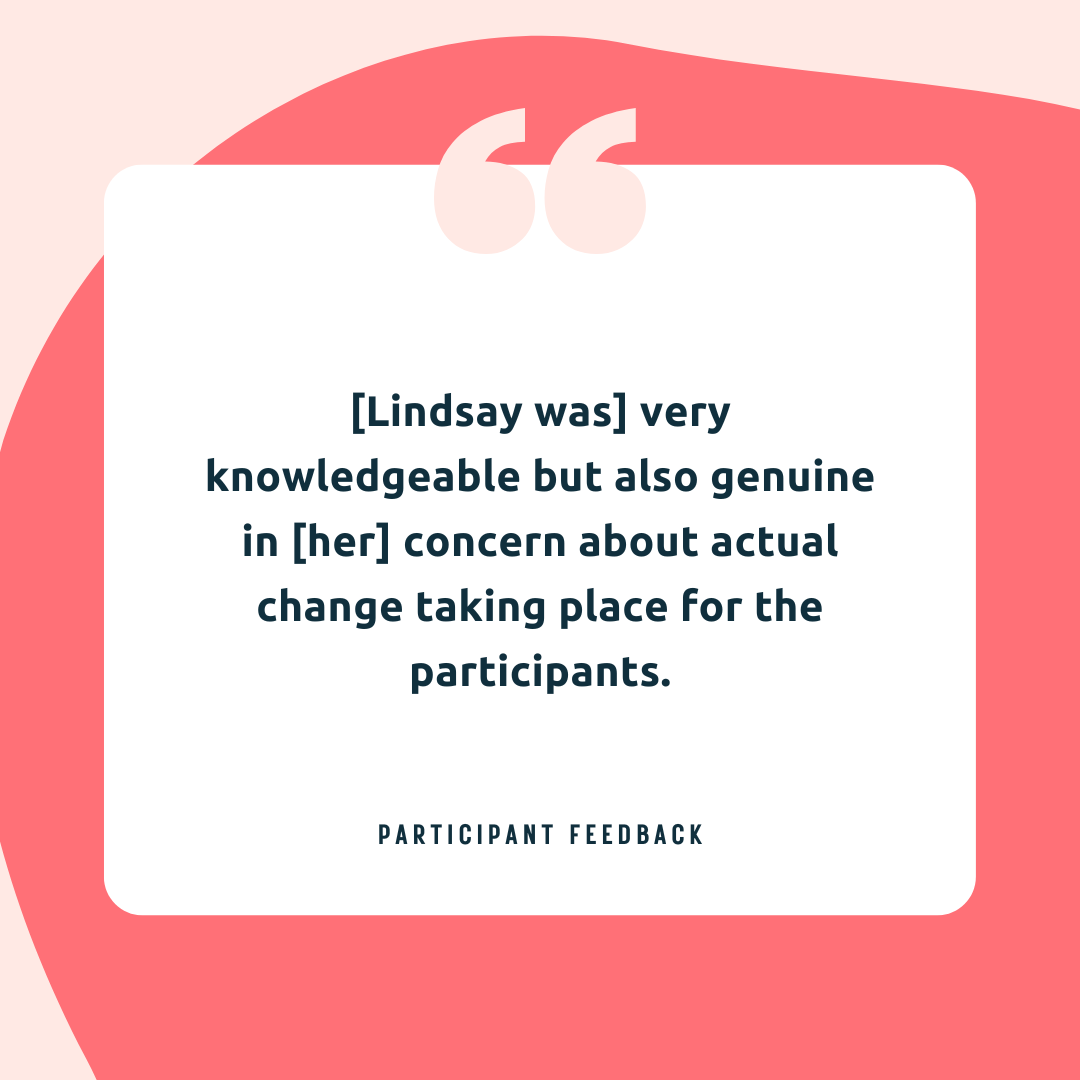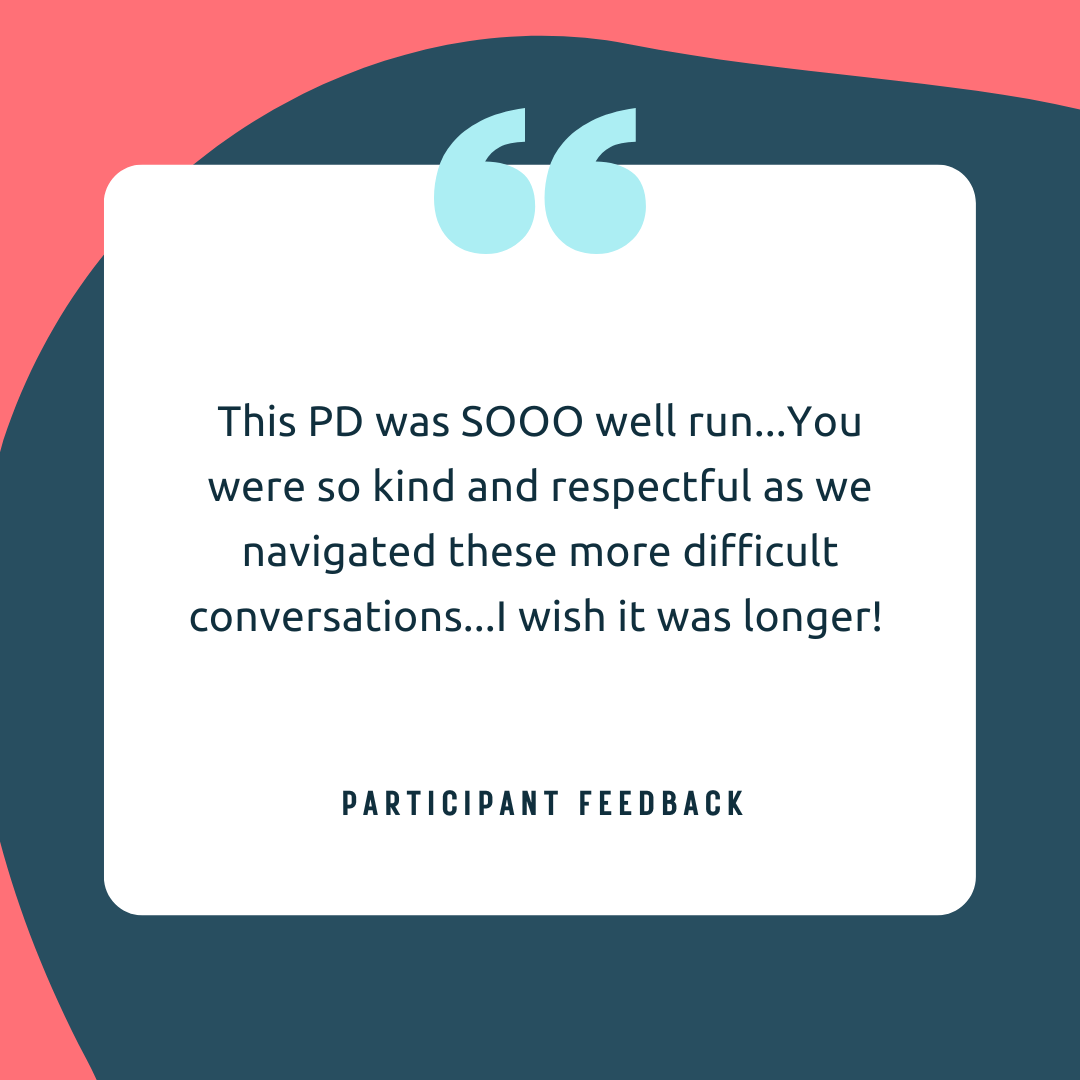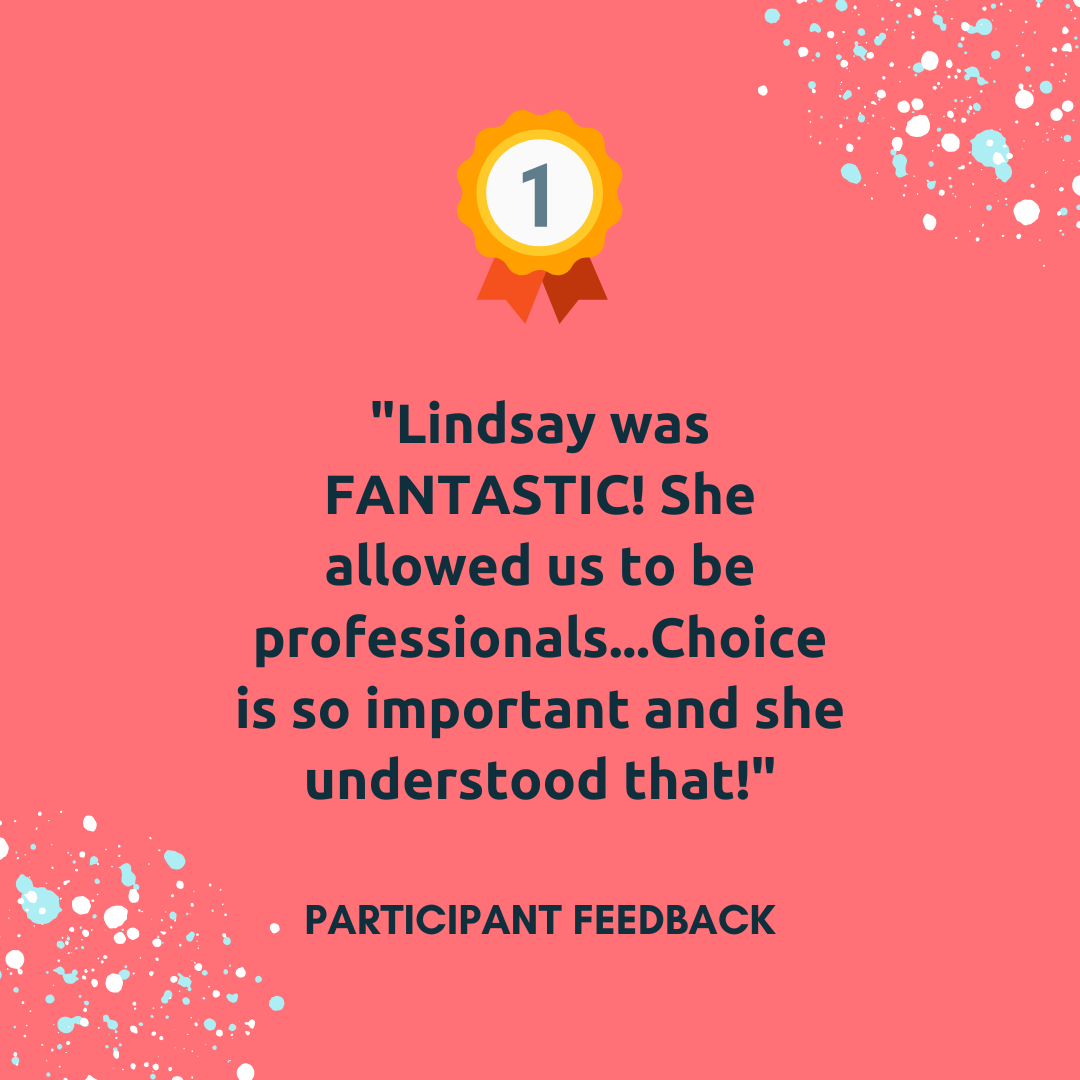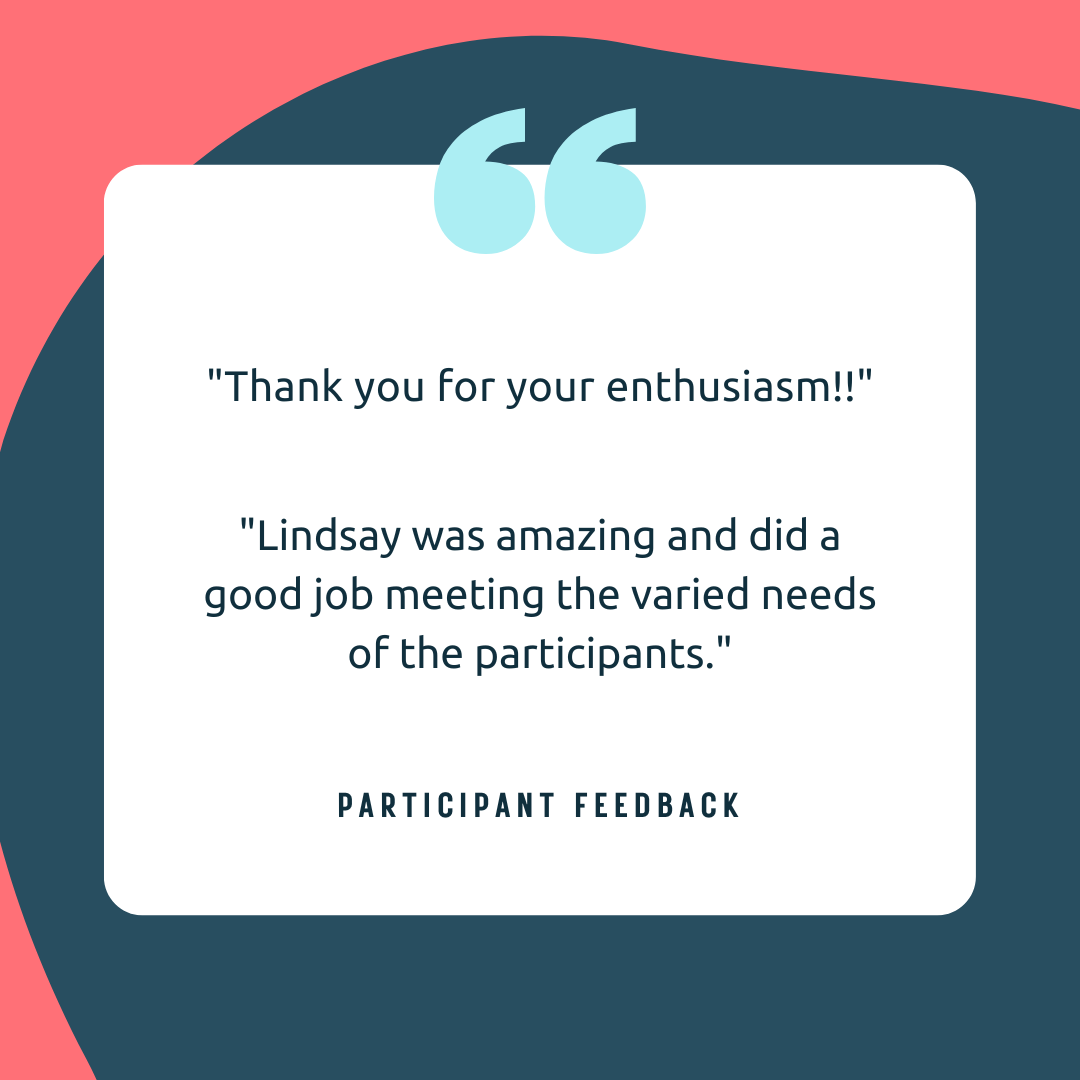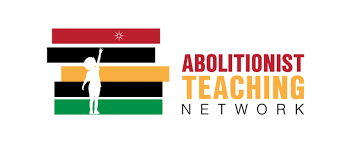Help your teachers build civics-based units so good
they make everybody want to dance.
Equitable, inclusive units grounded in intersectional justice.
Units that challenge, affirm, and inspire 100% of students.
TL;DR
AKA "I'm busy, Lindsay. What do I really need to know?"
Your instructional culture and curriculum will have sky-high levels of:
And each teacher will design a unit, personalized for their students, that includes:
- A compelling driving question
- An activist project—students apply what they know to advance racial, gender, ability, and linguistic justice in their communities
- Lesson-level protocols—students talk and grapple for 75% of each class
- Specific resources that center (hi)stories and voices that are often excluded from traditional curricula
I don't need convincing.
Civic engagement shouldn't be isolated to one unit, project, or course.
And it shouldn't live in just one department.
Just like justice cannot be an add-on, a separate task force. We can't "add diversity and stir."
Racial, gender, ability, and linguistic justice must be central to everything we do.
Curriculum—what and how we teach—is our bread and butter.
That's what we do as an institution of education.
Curriculum must be designed with intersectional justice at the core.
Exciting news...
because we don't want one more student to have to slog through a boring unit of sit-and-get featuring a bunch of old, rich, cis-het white guys....
We can make civic engagement central to 100% of the courses you offer.
And since I've been saying this stuff on repeat to curriculum leaders in 1:1 coaching calls for years now...
I designed a streamlined program so I could hand you a PD plan that:
Advances racial and gender justice through student activist projects
Skyrockets student engagement
Lays out the topics and activities for a semester's worth of PLC meetings
AND
Equips your staff with everything they need to
co-create new curricula that challenges, affirms, and inspires all students.
What types of coaching are part of this plan?
There's a Self-Paced Course:
There's a 2-Day Coaching Intensive:
There's 1:1 Leadership Coaching For You:
- Video lessons are designed to be used in department team meetings as built-in PD with prompts to create something tangible each week. (Enroll one member of each department in the course.)
- With a focus on the system-level work, it makes it WAY easier for teachers to build and implement new units.
- One digital planner for mapping out the curriculum at every stage (no more separate Google docs!)
- A massive bonus section including community workshops and relevant resources from my classroom
- Teachers have access to virtual drop-in coaching once per semester where I help them work through a question or challenge. (I plan to expand to monthly drop-in coaching in the future!)
There's a 2-Day Coaching Intensive:
- I spend 12 hours with your teachers to pilot the unit-building process through a hyper-focused, intensive or "design sprint." Different from your typical workshop—less "talking at," more "building with," and there's a finished ready-to-use product at the end.
- I help each teacher design a unit that enables co-creation with students
- By the end of the second day, each teacher will have created a new, 10-week unit from the unit's summative assessment down to what students are doing in each lesson.
There's 1:1 Leadership Coaching For You:
- I want you to be able to do the work I do in the coaching intensive without me. So, I work one-on-one with you to help you develop a training plan to build capacity for your instructional coaches, administrators, or department leads to facilitate coaching intensives with their departments.
- This looks like: me + you on Zoom for 1 hour, 8 times over the course of a semester. I recommend a bi-weekly cadence, but together, we'll schedule what works best for you.
To plan your Curriculum Boot Camp implementation, schedule a free 20-minute call.
Want the theory behind the district-wide approach? |
|
Let me paint you a picture of our work together.
Here's how this will go...
Step 1. You book a call.
You'll talk to me (Lindsay!) We do a systems-level curriculum audit to determine what your next best steps are.
Your next step might be Curriculum Boot Camp if...
You'll talk to me (Lindsay!) We do a systems-level curriculum audit to determine what your next best steps are.
Your next step might be Curriculum Boot Camp if...
- You have established a school/district culture of partnership with students and student-centered pedagogy. Or you're willing to make it a priority to support teacher teams to get there within one semester.
- You're ready to take action and build new curriculum in the next 6-12 months.
If we're virtual high-fiving by the end of the meeting, and we're both ready to do this thing...
- You'll tell me the number of departments (i.e., number of course enrollments you need)
- We'll block the dates for your 2-day coaching intensive
- I'll send you an invoice. Once that's processed, I'll set up course logins for each department lead + logins for you and any instructional coaches on staff.
- We'll schedule a formal planning call.
Step 2: We have our 1-hour planning call.
On this call, we'll schedule when and where (in which teams) teachers will complete each module of the course.
We'll also draft language to align this program with your existing district goals or focus area.
You sit back and relax because you're done planning PD for the next few months.
On this call, we'll schedule when and where (in which teams) teachers will complete each module of the course.
We'll also draft language to align this program with your existing district goals or focus area.
You sit back and relax because you're done planning PD for the next few months.
Step 3: Teachers complete the self-paced course within their regularly scheduled department meetings during the next semester.
Each week, teachers will watch a 10-20 minute video and work on the module's related task. (See major tasks below.)
Task 1. Build a student-centered protocol bank. Put these into a shared unit arc.
Task 2. Choose 4-8 priority standards for the department. Develop a shared "graduation-level" rubric that defines proficiency for each standard. Work backwards from there to define proficiency at each grade level.
Task 3. Outline a year-long "scope and sequence" for each grade. This will include Driving Questions (DQs) that frame each, quarter-long unit as well as the summative project options for students to respond to the DQ.
Teachers will say things like...
Each week, teachers will watch a 10-20 minute video and work on the module's related task. (See major tasks below.)
Task 1. Build a student-centered protocol bank. Put these into a shared unit arc.
Task 2. Choose 4-8 priority standards for the department. Develop a shared "graduation-level" rubric that defines proficiency for each standard. Work backwards from there to define proficiency at each grade level.
Task 3. Outline a year-long "scope and sequence" for each grade. This will include Driving Questions (DQs) that frame each, quarter-long unit as well as the summative project options for students to respond to the DQ.
Teachers will say things like...
Step 4: You get to see my smiling face again on our next planning call.
You'll tell me which department is ready for the 2-day coaching intensive. I then prep the agenda and send it to the chosen team. This conversation will be energizing! If you're like me, you'll smile so much your cheeks will hurt by the end of the hour. Sorry in advance.
You'll tell me which department is ready for the 2-day coaching intensive. I then prep the agenda and send it to the chosen team. This conversation will be energizing! If you're like me, you'll smile so much your cheeks will hurt by the end of the hour. Sorry in advance.
Step 5: It's time for some serious magic. The 2-day coaching intensive is finally here!!!
By the end of our 2 full days together, your team will have created one, 10-week unit down to the lesson level (e.g., lesson focus, text or resource students will be learning from/with, and the main protocol or activity students will use to engage in the lesson).
Teachers will love it...
By the end of our 2 full days together, your team will have created one, 10-week unit down to the lesson level (e.g., lesson focus, text or resource students will be learning from/with, and the main protocol or activity students will use to engage in the lesson).
Teachers will love it...
Step 6: You excitedly email me saying you absolutely LOVE the new unit and can't wait to talk about it.
So, we hop on our first 1:1 Leadership coaching meeting.
This is where we:
Step 7: We meet 7 more times via Zoom over the next semester.
You will determine the focus of these 1-hour calls, whether we use some to train or create materials to train coaches and team leads, or look at draft units or student work samples to support your coaching work. By the end you'll have a plan to support all teachers to develop 4, brand new units that advance racial and gender justice.
Step 8: We celebrate your district becoming a national model for justice-centered curriculum.
You get to enjoy the fruits of your labor. Showcase your work on my podcast. And...
WATCH. THE. STUDENTS. DANCE.
So, we hop on our first 1:1 Leadership coaching meeting.
This is where we:
- Make a plan to build coaches' (or department leads') capacity to facilitate a coaching intensive for their own departments.
- Schedule days for teams to work, uninterrupted on their curriculum development (and creative ways to fund this important work).
- Strategize how to leverage Modules 5, 6, and 7 of the course to support teams' work in outlining lessons, selecting quality resources, and evaluating the degree of personalization (e.g., identities affirmed, differentiated opportunities for engagement) in each lesson.
Step 7: We meet 7 more times via Zoom over the next semester.
You will determine the focus of these 1-hour calls, whether we use some to train or create materials to train coaches and team leads, or look at draft units or student work samples to support your coaching work. By the end you'll have a plan to support all teachers to develop 4, brand new units that advance racial and gender justice.
Step 8: We celebrate your district becoming a national model for justice-centered curriculum.
You get to enjoy the fruits of your labor. Showcase your work on my podcast. And...
WATCH. THE. STUDENTS. DANCE.
To plan your Curriculum Boot Camp implementation, schedule a free 20-minute call.
|
Want a sneak peek of my coaching?
|
|
Have More Questions?
I've got answers.
For which grade or subject is this program designed?
This program is grade and content-agnostic. I have worked with elementary, middle school, high school, and college level educators of all subject areas. Your teachers likely know their grade-level content area standards and certainly their students better than I do. I provide the tools and process for teachers to be able to turn that expertise into a justice-centered unit that challenges, affirms, and inspires their students. Lately, there has been lots of interest in transforming history curriculum, so that makes up the bulk of my current work.
Which grade or subject area is best for the 2-day coaching intensive?
Honestly, whichever team is most excited to pilot the process will be best because that energized commitment goes a long way. For one, we won't need to spend time on convincing anyone of the value of the work during our action-packed 2 days together.
That said, in my experience (perhaps influenced by my own teaching background?), middle and high school Social Studies and ELA/Literacy teachers tend to be most ready to redesign their curricula.
What exactly is an intensive?
An intensive is the name I use for any full day (6-hour) workshop that is hyper-focused on creating a usable product by the end of the day(s). I've facilitated and been a participant in full-day workshops that are not intended to have participants leave with a product they can use right away. It's easy to NOT implement the learning from typical workshops. Workshops have value, but they are different. Thus, my "intensive" label to distinguish from a typical "workshop."
This program is grade and content-agnostic. I have worked with elementary, middle school, high school, and college level educators of all subject areas. Your teachers likely know their grade-level content area standards and certainly their students better than I do. I provide the tools and process for teachers to be able to turn that expertise into a justice-centered unit that challenges, affirms, and inspires their students. Lately, there has been lots of interest in transforming history curriculum, so that makes up the bulk of my current work.
Which grade or subject area is best for the 2-day coaching intensive?
Honestly, whichever team is most excited to pilot the process will be best because that energized commitment goes a long way. For one, we won't need to spend time on convincing anyone of the value of the work during our action-packed 2 days together.
That said, in my experience (perhaps influenced by my own teaching background?), middle and high school Social Studies and ELA/Literacy teachers tend to be most ready to redesign their curricula.
What exactly is an intensive?
An intensive is the name I use for any full day (6-hour) workshop that is hyper-focused on creating a usable product by the end of the day(s). I've facilitated and been a participant in full-day workshops that are not intended to have participants leave with a product they can use right away. It's easy to NOT implement the learning from typical workshops. Workshops have value, but they are different. Thus, my "intensive" label to distinguish from a typical "workshop."
What if the departments in my district are actively practicing student-centered protocols, proficiency-based grading, and project-based learning (PBL)?
The self-paced course is designed to support teams across all levels of fluency in these practices.
The purpose of the main lesson and major task in each module is to weave together existing artifacts, systems, and practices (e.g., protocols, proficiency-based rubric, and PBL practices) to design a justice-centered unit. Teams can go into as much depth as they need to help them achieve each major task along the way to designing their units. Teams can just engage with the core lessons and tasks, and if there are specific modules or one department in which more support is needed, teams could choose to engage with as many of the deep dive lessons in the module as needed.
For more specific examples: A team that regularly uses several student-centered protocols but has not put them into a unit arc will benefit from the focus lesson in Module 1 that teaches them how to do that and offers examples. A team that uses some student-centered protocols, but would like to explore some more options for protocols across different purposes (e.g., discussion, peer feedback) would benefit from engaging with the deep dive lessons in Module 1 that share 3 protocols per purpose and all of the templates to put the protocol into practice in class next week.
For districts in which all teams already have all of the things—the things are: student-centered unit arc, one proficiency-based rubric shared by the department featuring 4-8 priority standards, AND experience with inquiry- and project-based learning and co-creating learning experiences with students—here's my advice to you:
First, amazing! I'd love to feature your district on my podcast. Second, if all of these things are in place and you just want support with the justice-based content (Driving Question, Specific Project Ideas, and Lesson-Level Design + Resources)...you may benefit from an accelerated timeline like this:
The self-paced course is designed to support teams across all levels of fluency in these practices.
The purpose of the main lesson and major task in each module is to weave together existing artifacts, systems, and practices (e.g., protocols, proficiency-based rubric, and PBL practices) to design a justice-centered unit. Teams can go into as much depth as they need to help them achieve each major task along the way to designing their units. Teams can just engage with the core lessons and tasks, and if there are specific modules or one department in which more support is needed, teams could choose to engage with as many of the deep dive lessons in the module as needed.
For more specific examples: A team that regularly uses several student-centered protocols but has not put them into a unit arc will benefit from the focus lesson in Module 1 that teaches them how to do that and offers examples. A team that uses some student-centered protocols, but would like to explore some more options for protocols across different purposes (e.g., discussion, peer feedback) would benefit from engaging with the deep dive lessons in Module 1 that share 3 protocols per purpose and all of the templates to put the protocol into practice in class next week.
For districts in which all teams already have all of the things—the things are: student-centered unit arc, one proficiency-based rubric shared by the department featuring 4-8 priority standards, AND experience with inquiry- and project-based learning and co-creating learning experiences with students—here's my advice to you:
First, amazing! I'd love to feature your district on my podcast. Second, if all of these things are in place and you just want support with the justice-based content (Driving Question, Specific Project Ideas, and Lesson-Level Design + Resources)...you may benefit from an accelerated timeline like this:
How do you define "transforming curricula"? What exactly is the tangible end product we'd be creating?
Departments will create a full year's curriculum (ideally 4, 10-week units) for each course down to an outline for each lesson. The lesson outline will include the focus topic/standard for the day, the main protocol or activity which also serves as formative assessment, and a text/resource/key question students will engage with.
Why is this better than choosing a pre-made curriculum with a high EdReports score?
There are great curricula out there. For sure. And...if you are trying to reach students who have been historically marginalized and disconnected from the curriculum, you'll have the most success designing units for those students. National curricula just can't design for each of your students' interests, needs, and aspirations.
My process stems from equity frameworks and evidence-based practices. Each big piece of the curriculum design process (e.g., picking priority standards, building proficiency-based rubrics, teaching through project-based learning, using student-centered instructional strategies, focusing on topics and resources that affirm a range of students' identities, planning for differentiation) has roots in research that says this is what works. It yields results for kids, particularly kids who we have underserved in the past. From my personal experience of using this design process for years, I can tell you, I have seen powerful results in engagement and student learning when I create units specifically for the learners in my classes.
Departments will create a full year's curriculum (ideally 4, 10-week units) for each course down to an outline for each lesson. The lesson outline will include the focus topic/standard for the day, the main protocol or activity which also serves as formative assessment, and a text/resource/key question students will engage with.
Why is this better than choosing a pre-made curriculum with a high EdReports score?
There are great curricula out there. For sure. And...if you are trying to reach students who have been historically marginalized and disconnected from the curriculum, you'll have the most success designing units for those students. National curricula just can't design for each of your students' interests, needs, and aspirations.
My process stems from equity frameworks and evidence-based practices. Each big piece of the curriculum design process (e.g., picking priority standards, building proficiency-based rubrics, teaching through project-based learning, using student-centered instructional strategies, focusing on topics and resources that affirm a range of students' identities, planning for differentiation) has roots in research that says this is what works. It yields results for kids, particularly kids who we have underserved in the past. From my personal experience of using this design process for years, I can tell you, I have seen powerful results in engagement and student learning when I create units specifically for the learners in my classes.
We've been talking about curriculum redesign for a while, but we don't want to get it wrong. Can we just do a "first step" workshop?
The short answer: Maybe.
The long answer: If you don't have a foundation of student-centeredness and the staff desire to practice culturally responsive and sustaining pedagogy, you should definitely work on that first. There are tons of workshop-style PD options out there, some of which I provide. There are also great 1:1 coaching options for teachers, coaches, and leaders that can help you address this adaptive challenge. We will not be successful if we don't address underlying beliefs, habits, and loyalties (Heifetz, Grashow, & Linsky, 2009) that are harming our students.
At the same time, students are actively being harmed when we wait to get it just right. At a minimum, we are underserving students with curricula that doesn't challenge learners appropriately, repeatedly affirm the multitude of identities and experiences of our students, and repeatedly invite students to be creative agents of change in pursuit of racial, gender, ability, and linguistic justice. Perfectionism is a tool of white supremacy. When we put off the curriculum redesign for another year, we're effectively sacrificing another year of our current students' academic experience. If you're worried about causing harm, you're likely doing everything you can to proactively learn how not to cause harm and responding with humility and informed action if and when we do cause harm. The students, families, educators, and activists I've worked with would take informed, imperfect action over non-action any day. Our action also communicates to students that we believe it is unacceptable to sacrifice a year of their education.
Nervous about "making mistakes"? We all do. I got you.
The short answer: Maybe.
The long answer: If you don't have a foundation of student-centeredness and the staff desire to practice culturally responsive and sustaining pedagogy, you should definitely work on that first. There are tons of workshop-style PD options out there, some of which I provide. There are also great 1:1 coaching options for teachers, coaches, and leaders that can help you address this adaptive challenge. We will not be successful if we don't address underlying beliefs, habits, and loyalties (Heifetz, Grashow, & Linsky, 2009) that are harming our students.
At the same time, students are actively being harmed when we wait to get it just right. At a minimum, we are underserving students with curricula that doesn't challenge learners appropriately, repeatedly affirm the multitude of identities and experiences of our students, and repeatedly invite students to be creative agents of change in pursuit of racial, gender, ability, and linguistic justice. Perfectionism is a tool of white supremacy. When we put off the curriculum redesign for another year, we're effectively sacrificing another year of our current students' academic experience. If you're worried about causing harm, you're likely doing everything you can to proactively learn how not to cause harm and responding with humility and informed action if and when we do cause harm. The students, families, educators, and activists I've worked with would take informed, imperfect action over non-action any day. Our action also communicates to students that we believe it is unacceptable to sacrifice a year of their education.
Nervous about "making mistakes"? We all do. I got you.
How much does this program cost?
The complete PD program is $20,000. Here's the breakdown:
The complete PD program is $20,000. Here's the breakdown:
- The course is $750 per enrollment. If you have 8 departments or teams and are enrolling the lead for each team, that's $6,000.
- The two-day intensive is $10,000, which includes a 1-hour planning and a 1-hour debriefing call with you (or the point of contact for this project). It also includes asynchronous communication via email and Google Doc comments to prepare and edit the materials.
- Semester-long leadership coaching (8, 1-hour virtual sessions) is $4,000.
Is my school or district ready for this program?
Your school or district is ready for this program if:
You may not be a good fit for this program if:
Your school or district is ready for this program if:
- You and your staff have a commitment to partnering with students and amplifying their voices in an authentic way. Meaning beyond a choice board. I'm not hating on choice boards, we're just going to be doing some next-level co-creation stuff.
- You are frustrated by justice and "DEI" work being treated as something separate from curriculum and instruction. You believe the best path towards equitable education is in ensuring 100% of what and how we teach is grounded in equity and intersectional justice.
- You and your staff are ready to take action, even if it's imperfect. You cringed when you thought about sacrificing a year of students' educational lives!
- You as the leader are committed to making this work THE priority for the next 1-2 years. Not a priority among a few. Justice-centered curriculum design has to be the focus. All other PD should connect with and support this goal.
- You are willing to dive into student experience use methods like those in Street Data to measure the student experience of the new curriculum as it's implemented. Unfamiliar with the book? We'll talk all about it in our coaching calls. As long as you're game to look beyond just the quantitative test score types of data to include qualitative, experiential data as a valuable source of information, we're good.
- You can't wait to see your students love learning so much they break out in dance.
You may not be a good fit for this program if:
- You still need to work on your staff culture (i.e., partnering with students). If this is you, don't worry. Let me know what struggles you're having, and we'll find some good PD for you!
- You're not ready to make space for teachers to have 2 full days away from the classroom so they can write new curriculum. (If you're willing to do it, but unsure how, that will be part of our planning and coaching calls.)
- You have other school or district priorities that will make it impossible to truly prioritize justice-centered curriculum writing. Reach back out next year!
- Intersectional justice and educational equity are not part of your core values. If that's the case, we won't enjoy working together. That said, I'm all about personal growth, so I'll be here for you if your values change.
Whether you read this whole page or skimmed your way through...
you made it to the very end!
This tells me you are committed to this work, and I would LOVE working with you.
So...let's figure out how this would work in your school or district.
So...let's figure out how this would work in your school or district.
"Adaptive challenges [are] gaps generated by bold aspirations amid challenging realities...What is needed from a leadership perspective are new forms of improvisational expertise, a kind of process expertise that knows prudently how to experiment with never-been-tried-before relationships, means of communication, and ways of interacting that will help people develop solutions that build upon and surpass the wisdom of today's experts.”
